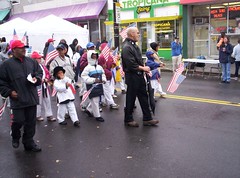Street festivals and city fees
Yes there is a problem with fee costs and street festivals. Yes there is a fee waiver process. No the process isn't widely communicated. No there isn't a "cultural plan" regarding street festivals or a consideration of their economic value to the city or for community building value, or a consideration of how these events contribute to the reputation and excitement quality and placemaking value of the city.

Northeast Tae Kwon Do marching in the Brookland Day parade, 2005.
According to the City Paper's Loose Lips columnist, Fox5 did an "investigative story" on the fee waivers. From the column:
Waive This!: Fox 5's Paul Wagner wins the morning with this investigative piece about the city's apparently new practice of waiving police security fees for certain events, like the National Marathon. "In the last two years, more than $600,000 has gone uncollected, money that should have been paid to the city for security at special events." The marathon, Wagner notes, attracts enough runners to generate at least $700,000 entry fees, yet the city waived about $200,000 in police costs last year. Another piece of the story: A homeland security fund absorbs the costs for other events, like the Georgia Avenue Caribbean carnival.
I have written about this before. Even a two block street festival in Brookland expecting 100s to a couple thousand people (you fudge some on the numbers, because as the number of attendees climbs, so does the required number of official personnel and services, which raises costs)--I ran this event in 2007--costs about $12,000 in city fees for police, other emergency personnel, inspections, use of the public space, etc.
A typical community organization doesn't have that kind of money, and regardless of what people might think, it's hard to raise sponsorship monies to pay those fees, and exhibit fees for booths hardly come close to covering those fees.
Mount Pleasant Festival (in my opinion one of the best truly "neighborhood festivals" in the city) in 2004 got tagged with a $48,000 fine because the inspectors said that tents were bigger than what had been permitted... (This article from the Washington Times is not available for free, but covers the story, "Lawmaker to look into fines for festival."
There is a fund for constituent services out of the Mayor's office that will cover these costs (a waiver), although you have to be told the fund exists. I didn't know originally, but someone, maybe from the Police Special Operations Division, mentioned it to me.
The real issue is the cost of the fees, and whether or not such events are to be encouraged and offered in the city. There didn't use to be big fees, but City Council passed a bill stating that fees for such services must be assessed.
Yes, there should be a more transparent process, yes the economic and community building value of special events should be quantified.
But a story on fee waivers to big events and small events is not some big deal story, either for tv or the City Paper. Instead, the real story is how much money these fees are, how difficult it is to do special events, whether you represent a large or a small organization, and how can special events be supported in ways that contribute in a variety of ways to the quality of life and excitement value of the city.
Labels: community organizing, provision of public services, special events and programming, urban design/placemaking



0 Comments:
Post a Comment
<< Home